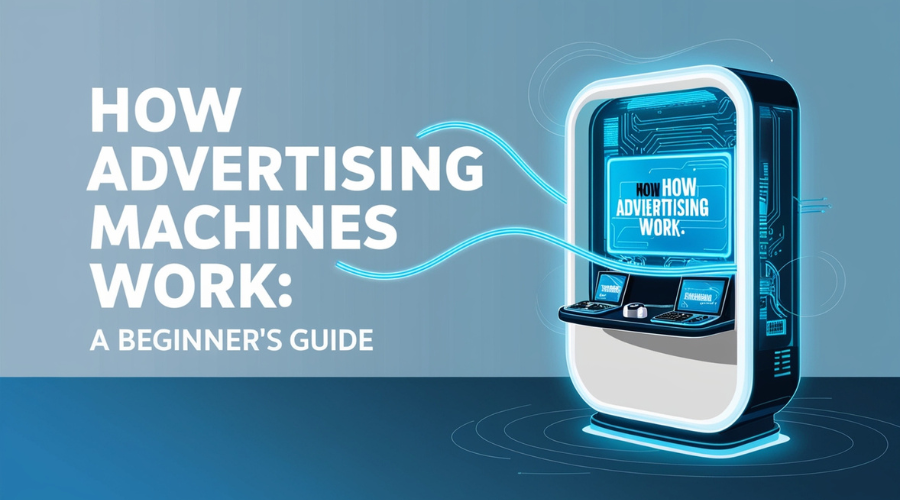.jpg)
Blogs
How Advertising Machines Work: A Beginner’s Guide

Have you ever felt that it's strange how those advertisements seem to know what you want? Or how a billboard will alter a message throughout the day? You are in the world of advertising machines! These intelligent systems are everywhere, working behind the scenes to present us with the most relevant advertisements at the right moment.
We will discuss this interesting mechanism of these machines and the reasons why they have been so crucial to us in our everyday lives.
What are Advertising Machines?
Advert machines are intelligent structures that determine where to place their advertisements and even to whom they should target. They are like matchmakers; they attempt to find the right ad with the right individual at the right time. You will see these machines everywhere, including the websites you access and digital billboards on the road.
They involve computer programs and data used to inform their decisions regarding advertising. The reason they are termed as machines is that they are automated in the sense that human beings do not need to make every decision on which advertisement to run. Precisely as a vending machine serves you with a specific snack once you have pressed a button, an advertising machine will serve you with a given ad based on the information it has about you.
Types of Advertising Machines
Various types of advertising machines are at work all around us. Now, let us see the principal types:
Online Advertising Machines
More likely, these are the ones you communicate with most frequently. Whenever you make a decision, use social media, or search online, advertising machines are running to determine what products you will see. They see what you have searched for, the websites you go to, and what you have clicked on previously.
Digital Billboard Systems
Advertising machines also run those large electronic signs found on highways and in inner cities. The ads can be flexible, depending on factors like time, weather, or traffic, as determined by the system.
Mobile Application Advertising
Advertising machines select the adverts that you see on your phone apps. These systems are aware of the apps one is using, when they are used, and how well they communicate with them. This helps them select ads that have a higher probability of being of interest to you.
Streaming and Television Advertising
Now, even your streaming services and TV shows have advertising machines. These systems are capable of displaying various advertisements to various homes even when they are tuned to the same show at the same time.
How do These Machines Get to Know You?
The advertising machines require information to operate. They acquire this information in several ways:
Your Browsing History
Cookies are small files that are commonly downloaded to your computer when you visit websites. Such cookies remember the sites you have visited and the things you have viewed. This enables the advertising machines to understand your interests.
Your History of Search
The things that you are looking at online are what advertising machines know that you may be willing to purchase. So, when you search for running shoes, they may present you with ads for sports products.
Your Location
Many advertising machines are aware of your location, particularly on your phone. This helps them display ads from adjacent stores or restaurants to you.
Your Social Media Creative
The ad machines learn about your interests and preferences by analyzing posts that you like, share, and comment on. The information enables them to select more relevant advertisements.
Algorithms: The Brains Behind the Machine
The backbone of any advertising machine is what is known as an algorithm. An algorithm can be visualized as a recipe that instructs the machine on what to do. An algorithm can instruct the advertising machine to select the correct ad, just as a recipe can advise you on how to go about baking a cake.
These algorithms are highly complicated and can process enormous quantities of information in a very rapid manner. They browse through thousands of details to determine the advert to display to you. These are some of such factors:
- • The device that you are using
- • Your age and gender (provided it is known)
- • Your history on the web
- • Click behavior of other people like you
The Advertising Auction: Selection of Ads
This is where things become interesting. An auction takes place in the background when you visit a site or open an app. This auction will occur before you know it, and you won't see it coming.
How the auction works
Several businesses want to display their advertisements to you, so they compete with one another to have the opportunity to show them to you. The advertising machine has this auction, and they indicate the ad that wins depending on two main aspects:
- The amount that the advertiser is ready to pay
- Relevance of the ad to you
The most attractive pricing and relevancy win the auction, and the advertiser gets to display their advert to you.
Why Auctions are important
This is the auction system that will help ensure you view advertisements that are truly useful to you, rather than random ads. It also assists websites and apps in earning income by selling their advertisement space to the highest bidders.
Real-Time Decisions: Speed is important
The speed at which advertising machines operate is one of the most remarkable aspects of their design. The advertising machine must do the following when you press a site:
- • Decide what you have figured out to be
- • Check your interests and actions
- • Conduct an auction for the advertisers
- • Which ad wins?
- • Put up the advertisement on your screen.
This is all done within 100 milliseconds or even before you can blink your eyes!
The technology behind the speed.
The advertising machines are based on powerful computers and specialized software that enables them to work this fast. They must make millions of these decisions each second as individuals around the globe read the internet, use apps, and access digital content.
Privacy or Advertising Machines
That raises a question of privacy, given that it is said that machines know a great deal about us. It is a legitimate issue, and your privacy is safeguarded in several ways:
Rules of Data Protection
Most countries have regulations that require corporations to disclose the type of information they gather and the purposes to which they put it. These are commonly referred to as privacy notices on websites.
Anonymous Information
The majority of advertising devices do not even notice that your name and personal information are known. They understand that a person who enjoys sports and lives in Chicago has gone to a website. They will establish a profile of you based on your behavior; however, it is not directly linked to your real identity.
Control Options
The type of data that advertising machines gather on you is largely controllable. In most browsers, you can turn off cookies. On many websites, you can also configure your privacy settings.
Advantages of an Advertising machine
Though specific individuals are concerned about advertising machines, the very fact is that they have multiple advantages:
More Relevant Adverts
As opposed to random ads, you will likely get to view ads on more products and services that you care about. This saves you time and can help you find something that genuinely interests you.
Free Content
It is thanks to advertising machines that you receive websites, apps, and services without having to pay for them. With advertising revenues gone, many of the online services you enjoy may have to switch to charging subscriptions.
Improved Experience with the User.
The advertising may be relevant to the things you are interested in, hence less irritating. You can even find new products or services that would enhance your life.
Final words
Advertising machines exemplify technologies that simplify and personalize our lives. Learning how they operate can help you make informed choices regarding online privacy. You will gain a better understanding of the technology that makes most of what we consider free accessible on a daily basis.
